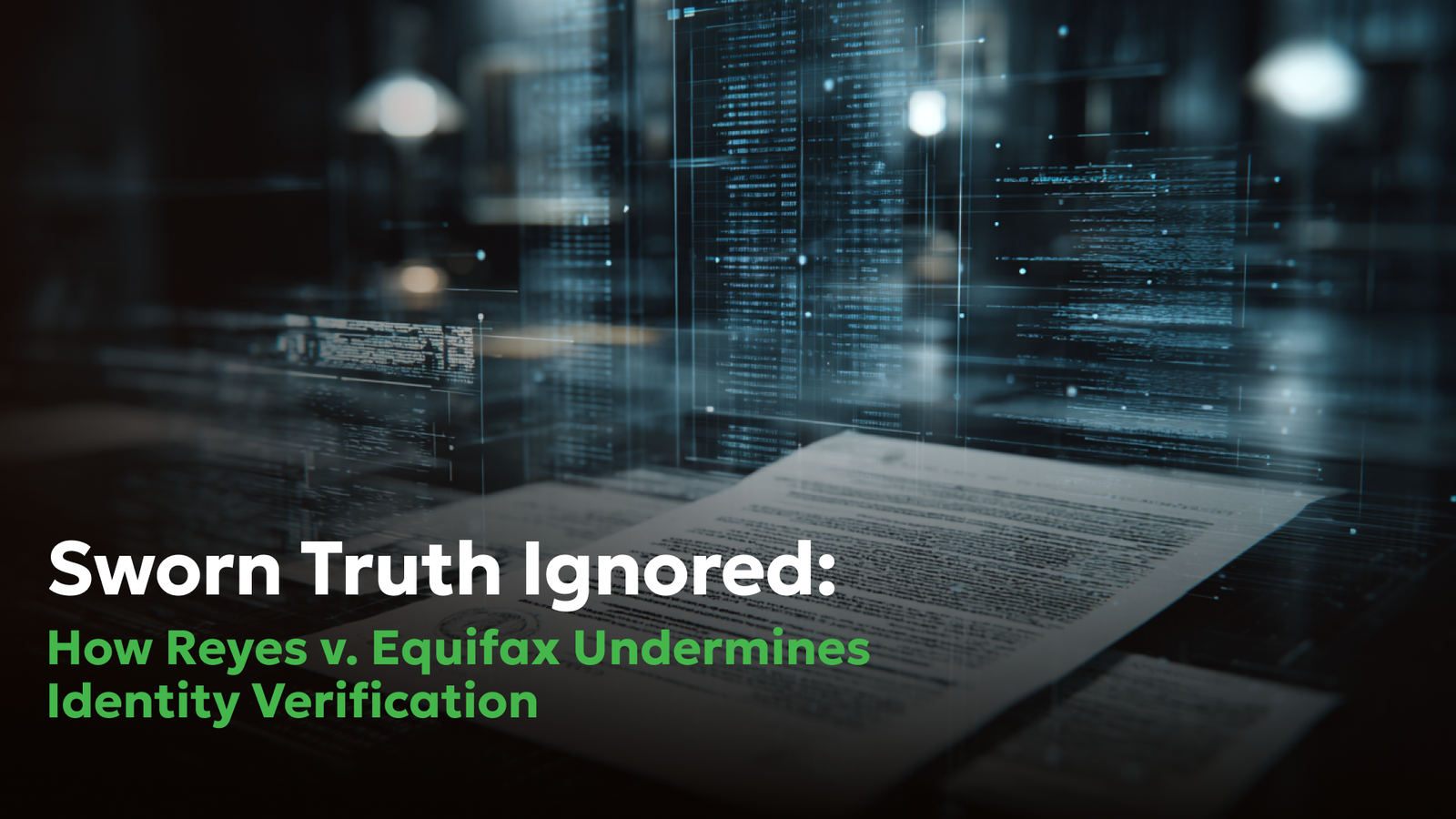What Is Synthetic Identity Theft and Fraud?
- Blog
- Credit Report Identity Theft
What Is Synthetic Identity Theft and Fraud?

Don’t Let Synthetic Identity Theft Ruin Your Life. Consumer Attorneys Helps You Protect Yourself from Becoming a Victim!
Synthetic Identity theft is a crime that has changed many lives in the worst way. If you’ve ever wondered about identity theft or found yourself being a victim, you don’t have to take identity theft lying down. Learn about the preventative steps you can take to protect yourself in the future.
Synthetic identity theft is a growing sector of financial fraud in which a person’s sensitive details like their Social Security number, and other details are stolen and then combined with other false or “fake” information to create a new identity. The purpose of this type of theft is to create a synthetic or “fake” identity with some parts real and other parts completely made up. The thieves will then use the synthetic identity to commit synthetic identity fraud by opening accounts, getting loans, or making purchases under the fake identity. Both theft and fraud are illegal and should be reported immediately.
How to Prevent Synthetic Identity Theft
Prevention starts with being proactive. Safeguarding your details both online and off can help you prevent synthetic identity theft. Please check out our list of tips below.
- Secure personal info. Secure your sensitive details and personal identifiable numbers like your Social Security number. This means not writing it down on loose pieces of paper, not saying your social security number out loud where others can hear, and never sharing it with anyone unless necessary.
- Use a VPN. Consider using a VPN (virtual private network) on your devices. This can help block unwanted browsers and hackers from accessing your connection.
- Update passwords. We recommend changing your password regularly and using very strong passwords
- Use a password manager. Password managers help secure your passwords and require authentication when used on separate devices
- Use two-factor authentication. Using two-factor authentication on your devices when it is available because it adds an extra layer of protection that helps prevent hackers from gaining access to your information
- Keep devices updated. Keeping your devices updated can help prevent thieves from getting access to your machine and your information because the latest updates usually come with updated security features necessary to continue protecting your devices and your information
- Use virus and malware protection. Installing virus and malware protection on your devices can help prevent cyber-attacks that might result in leaked information allowing criminals commit theft and fraud.
- Pay attention to emails. A lot of cyber-criminals have mastered the art of drafting compelling enough emails and subject lines in emails that make you want to open them quickly. If you receive emails, avoid opening the emails right away and instead check the sender’s name and email to see if it’s from a reputable company.
- Report suspicious activity. If you notice an email that is asking for money or is from an unknown source, be sure to report it to your HR department so they can alert other members of the team.
- Work as a team. Oftentimes, preventing attacks means working with your colleagues or family to prevent attacks. You can do this by not giving out other people’s information and protecting vulnerable people’s (children and elderly) sensitive details.
How Does Synthetic Identity Theft Work?
The way that this type of theft is done is that criminals will gain access to someone’s sensitive information like their Social Security number or birth date and then use those details along with fake details in order to create a sort of “Frankenstein” type of identity also referred to as a synthetic identity. Once they’ve created the new identity, they open up bank accounts, and apply for loans, credit cards, and other financial offerings, causing the real person to have errors on their credit profile when in reality they didn't open up any of the new accounts. Once the fake identity is used to begin opening accounts and acquiring things, synthetic identity theft turns into synthetic identity fraud.
Synthetic Identity Theft Examples
Below are examples of synthetic identity theft to look out for.
- When criminals steal the Social Security numbers of children in order to create a fake identity
- Stealing sensitive details from elderly people to create fake identities and then make purchases under the synthetic identity
- If a criminal takes someone’s personal details and then combines it with fake details to create a fake driver’s license
- If a criminal uses someone’s information to create a false identity and then opens up new accounts under the synthetic identity.
If you’ve experienced any of the examples above or something else, we want to speak with you. Synthetic identity theft is illegal and can have serious negative consequences if you are blamed for the fraud or if it appears on your credit profile.
What to Do If You Are the Victim of Synthetic Identity Theft
If you are a victim of synthetic identity theft, you need to report it immediately to your credit card companies, banks, mortgage companies, and the three major consumer reporting agencies, “credit agencies” (Experian, Equifax, and TransUnion). Credit agencies can put freezes and holds on your accounts to prevent any additional transactions for credit and also require more stringent authentication if the thieves try to continue using your details in the future.
Be sure to report the theft to your local police station and get a police report documenting what you reported. Getting a police report can be helpful later on in the investigation process. You should also report the theft to the Federal Trade Commission and be sure to call a reputable law firm like Consumer Attorneys.
Who to Contact
As stated above, you should contact your banking and credit institutions, the police, and an experienced attorney like the lawyers at Consumer Attorneys. Our attorneys have clients nationwide and we are confident we can help you with any of the following and more!
- We will answer your questions and help determine if you have a viable case
- Draft and file all legal documents for you
- If you need assistance disputing credit report errors, we assist you with this process
- If consumer reporting agencies report and continue reporting erroneous information caused by synthetic identity fraud, we will help you hold the credit bureaus accountable.
- If you have suffered harm and had your credit report adversely affected because of theft or fraud we can help you get reimbursed for the harm you endured
No matter where you are in the process, if you are a victim of fraud, you deserve to work with attorneys who have experience disputing and having credit report errors removed and who will hold credit bureaus accountable for their mistakes.
Frequently Asked Questions
Typically, synthetic identity theft singles out people who are more vulnerable to financial crimes, such as children and the elderly. They often have a limited or clean credit history, which consequently allows criminals to target their information in order to form fake identities. Moreover, anyone living in marginalized areas may be at greater risk because of a lack of information or protection against predators like synthetic identity theft criminals who prey on others for their own personal gain. Synthetic identity fraud can cause irreversible damage to credit and financial accounts. It’s important to report any instances of theft and fraud immediately in order to mitigate damage to your credit.
Reporting synthetic identity theft is an effective way of slowing it down and mitigating any future theft. It’s important to move quickly when you realize that you may be a victim. You can initiate the reporting process by contacting Experian, Transunion, and Equifax. You can request that they place fraud alerts on your credit files. Additionally, contacting your banking institutions, your local law enforcement agency, and the Federal Trade Commission (FTC) is advised. You can report some issues online, but it will likely be a quicker process if you call and speak with someone who can assist you.
It's huge! There is an alarming rise in synthetic identity theft cases. And unfortunately, it’s continuing to grow so rapidly that it’s estimated that around $40B has been stolen because of synthetic identity theft. This form of fraud has surpassed credit card fraud in terms of growth. It is the fastest growing form of fraud in the world! The web and lack of awareness has made many consumers easy prey for thieves. Lack of protecting passwords and sensitive information, failing to update software, opening and responding to phishing emails, and getting caught in scams have made it easier in recent years for criminals to steal others’ information for their personal gain.
It depends. In some circumstances, some of the damage identity theft caused you may be reversed. For example, if you notice fraudulent charges, and you report them to your bank, your bank may reverse the charges. If you then prove to the credit agencies that the charges were fraudulent, they may then remove the negative items the theft caused in your credit report. In other instances, like if you are facing synthetic identity theft, your details may be so entangled with the new identity that the thief created that it can sometimes take years to undo the damage.
The risks of synthetic ID (identity) theft are huge because of the amount of leverage thieves have once they create separate identities with your information. The use of synthetic identities with your information can go on for years and you run the risk of having your credit and financial profiles damaged. You will also have to spend time and money trying to fix the problem. If you don’t recognize the theft early, you could even run the risk of facing legal consequences for someone else’s actions. It’s important to review your credit profiles often and contact our identity theft attorneys if you suspect you may be a victim of synthetic ID fraud.


Daniel Cohen is the Founder of Consumer Attorneys. Daniel manages the firm’s branding, marketing, client intake and business development efforts. Since 2017, he is a member of the National Association of Consumer Advocates and the National Consumer Law Center. Mr. Cohen is a nationally-recognized practitioner of consumer protection law. He has a we... Read more
Related Articles




R
ONGS™You pay nothing. The law makes them pay.







